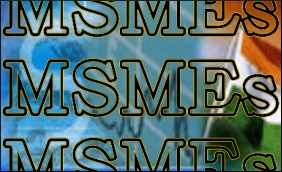|

|
'Today SMEs need to adopt strong tech-enabled biz models'
|
|

|
|
| Top Stories |
 |
|
|
|
Nishant Arora | 25 Jul, 2017
In their quest to become digital, Small and Medium Enterprises (MSMEs) need to adopt strong tech-enabled business models and processes to make them more efficient and achieve global competitiveness, says a top SAP India executive.
At a time when large corporates as well as MSMEs are seeking to accelerate their digital growth journeys, these firms have to excel in three areas: access, enablement and affordability.
The SME sector is the fastest growth driver for SAP globally. From over 8,800 SAP customers in the subcontinent, over 6,700 companies are SMEs.
"To help MSMEs transform digitally, we have signed a MoU with the Ministry of MSME to launch "Bharat ERP", a programme to empower MSMEs with next-generation technologies," Deb Deep Sengupta, President and Managing Director, SAP Indian Subcontinent, told IANS.
In this programme, MSMEs will receive training and enablement courses on SAP 'Business One' solution -- an all-in-one enterprise resource planning (ERP) solution.
MSMEs will have access to cutting edge, next-generation technology from SAP that can streamline and integrate key processes such as financials, sales, inventory and more -- with a single business software.
"Bharat ERP initiative aims to empower 30,000 MSMEs and youth in three years," Sengupta added.
Started in 1996, SAP India with over 11,000 employees is the second-largest subsidiary and one of the fastest-growing companies within SAP worldwide.
Headquartered in Germany, the multinational software corporation -- that develops enterprise software to manage business operations and customer relations -- has a presence in eight Indian cities and spends over 13.8 percent of its total revenue on research and development.
SAP has more than 600 partners in various geographies, including Global Service Partners like Wipro, TCS, HCL, Infosys, Tech Mahindra and Larson and Toubro.
Ranked 11th in India's 'Best Companies to Work in 2017' by Great Places to Work Institute, Sap India recently launched a 'Code Unnati' programme to bridge the digital skill gap in the country.
"Our ability to tap into the digital opportunity can get impeded by a shortfall in skill development and employment creation. SAP's 'Code Unnati' initiative is envisioned to bridge this digital skill gap and assist the government in achieving its vision for digital literacy," Sengupta noted.
'Code Unnati' is designed to serve as a collaborative platform for the private sector to join forces and work towards enabling India's youth for New Age jobs, thereby increasing their employability.
SAP's role is to provide technology infrastructure, expertise on course curriculum, delivery mechanisms and educators.
"Our aim is to accelerate India's digital plan of enabling 60 million citizens on digital technologies by 2019," Sengupta said.
With the GST rollout, a major hurdle is crossed. "The impact of GST has resulted in a strong push towards India becoming a formalised economy. We believe that GST adoption is not a tax problem but rather an opportunity to digitise by embracing technology," the executive told IANS.
Toward this, SAP India has launched 'GST in a Box' and 'Digital Compliance Service for GST,' which is a Cloud-based online application.
According to Sengupta, the effects of GST on organisations will be in three stages. In stage one, the compliance, transparency and leakages will be avoided.
"In stage two, there will be improvement in the efficiency of the supply chain. These two stages will then lead to the third stage, that is, improvement in customer experiences because at the end of the day, that's the real impact which most companies are looking for," Sengupta emphasised.
Leveraging artificial intelligence and machine learning in a Cloud-based environment is the key today.
"A great example of this is the recently launched 'SAP Leonardo', a digital innovation system and enablement network that helps organisations integrate and leverage emerging technologies such as IoT, blockchain, artificial intelligence and big data," Sengupta said.
When it comes to data security, SAP India believes companies should codify and protect their intellectual property (IP) and core competencies.
SAP closely follows and complies with the German Federal Data Protection Act.
"We have an excellent track record of safeguarding businesses against the evolving IT threat landscape. Our customers are assured that their mission-critical data is well-protected from all types of attacks -- whether it is stored on-premise or on the SAP Cloud," Sengupta added.
(Nishant Arora can be contatced at nishant.a@ians.in)
|
|
|
| |
|
|
|
|
|
|
|
|
|
|
|
|
|
|
| |
| Customs Exchange Rates |
| Currency |
Import |
Export |
US Dollar
|
₹88.70
|
₹87 |
UK Pound
|
₹119.90
|
₹116 |
Euro
|
₹104.25
|
₹100.65 |
| Japanese
Yen |
₹59.20 |
₹57.30 |
| As on 30 Oct, 2025 |
|
|
| Daily Poll |
 |
 |
| Who do you think will benefit more from the India - UK FTA in the long run?
|
|
|
|
|
|
| Commented Stories |
 |
|
|
|
|
|
| |
|